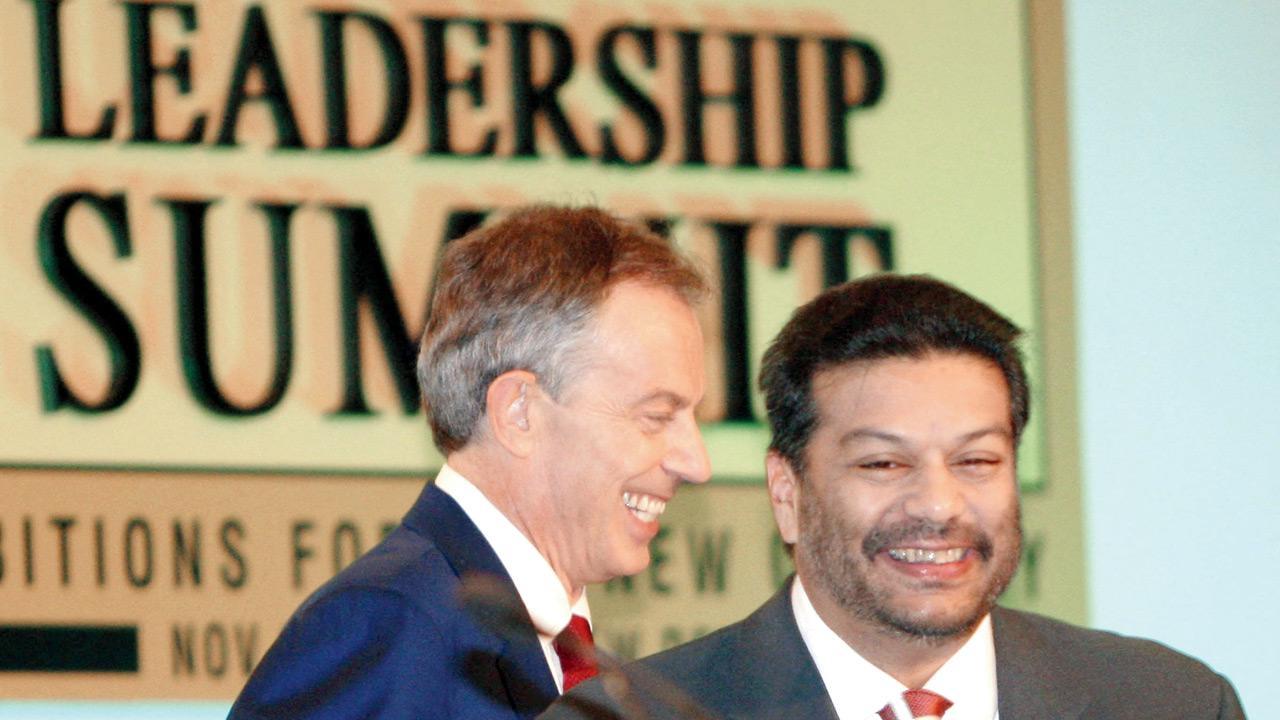Inherent privilege cannot be the only prism to view success (or failure) from. I’ve had to rethink this myself

Former British Prime Minister Tony Blair with Vir Sanghvi
In a fairly substandard movie called Shagird (2011), directed by Tigmanshu Dhulia, reporters from Aaj Tak, New York Times, and a veteran journalist called Mr Jindal, get abducted by a terror group, although they were separately promised an exclusive interview!
ADVERTISEMENT
Accusing ‘Mr Jindal’ of having been paid off by multiple political parties, the Aaj Tak TV reporter says, “I know you think of yourself as an intellectual, and write about Bihar’s poverty and Italian cuisine with equal love—you’ve been called to write about quick terrorist recipes!”
Now whatever the hell that means, it’s clear the terrible jibe is directed at journalist Vir Sanghvi—on whom most Indian readers of English publications might have some view or the other.
My spot surveys reveal one-word descriptions from “smug”, “entitled”, “indifferent” to “insightful”. Although I’ll go with a true-blue “chiller”, meaning it as the greatest compliment I know!
Besides spotting a cockroach in his company-owned accommodation, and therefore having to shift to The Grand Hotel in Calcutta instead—the hardships in the journalism of Sanghvi, 65, narrated in his riveting memoir A Rude Life, involves being shoved into back/economy seat of the Prime Minister of India’s plane/entourage. Or not being at the high table of the President’s banquets for visiting heads of states!
The journalist’s memoir, A Rude Life
At 19, Sanghvi became editor of a magazine called Bombay (modelled on New York), from the stable of India Today (modelled on Time). Right after returning from Oxford, barely in his early 20s, he editorially headed a publishing group (that included a magazine called Imprint).
What follows is a life that’s seemingly either about going, or being taken out, for lunches—along with media barons often times, to meet a politician, or an industrialist. There are breakfasts (he abhors), and dinners, too. These are old-fashioned folk, calling in on someone—to physically establish/widen networks. You’ll sense no envy, because that emotion is reserved for equals.
Sanghvi landed his first job, as he puts it, because the business-head running the show was his friend’s mom. The second job, because the publisher-owner was his late dad’s buddy.
Either way, it appears, up until the ’90s, an Oxford/Cambridge (Oxbridge) degree almost guaranteed getting airdropped into top editorial positions in Indian journalism. The elite Arnab Goswami is both Ox & Bridge (went to both), by the way. Its current equivalent, who knows, might well be a super-expensive master’s degree from Columbia School of Journalism!
But that’s just a head start, and I know it’s all-important. What emerges from that first job’s still gotta be you. And privilege might have an opposing effect.
Basically it’s about what you do with it—especially in media, news/journalism included, where a degree in the long run isn’t worth the paper it’s written on. Beyond a point, how do you teach someone to ask the right question; or make a coherent argument?
But access is the axis on which so much journalism is centred. At the top, in any case, it feels like the celebrity is a class of its own—bigwigs of sports, media/arts/entertainment, industry, politics are simply BFFs, regardless—with such little in common otherwise.
You get even more of it in certain autobiographies—having first sensed it with Salman Rushdie’s Joseph Anton. As if those who make it, so to say, memorialise/tag along none of their childhood/college buddies, who may be regular-Joe type bankers, wankers, teachers, preachers! Do those just disappear?
Sanghvi is someone you could call an access journalist—multiple Prime Ministers onwards (Modi years are mysteriously missing). And, I mean that in no way as derision. Although the Radia Tapes were indeed the only visible spot in his otherwise glorious career—he hardly gets into its details, beyond the tested claim that the tapes were altogether doctored. This is a quasi-confessional opportunity missed.
Radia looks like pocket change though, if not a stringent purity test, compared to a series of open scandals within Indian news media that have followed since—one involving Arnab and BARC, that people have forgotten already!
Given 46 years as a multi-media professional, much before it became a thing—as newspaper/magazine editor, political commentator, TV figure, chat show host, lifestyle connoisseur/columnist—what you can’t miss is the level of access that must’ve been earned.
Because those at the top are likely to be your admiring consumers as well—on a staggering range of subjects, that too. Including developing the food/restaurant beat, that a Delhi top editor will take seriously—only if they don’t take themselves too seriously! This is rarest of the rare. Doesn’t matter so much anymore who all his father’s friends were.
It helps more, as you can also tell from Sanghvi’s 416-page breeziest read for a memoir, that he’s blessed with prose, that flows. With a way of putting across arguments gently on screen as well. Both qualities getting extinct, as we speak.
Not shying away still from take-down observations that make non-fiction delightful—whether it’s him mimicking self-centred writing styles of Khushwant Singh, Dom Moraes; calling Narasimha Rao a small time manipulator; or taking a dig at Satyajit Ray’s “Oxford-on-Hooghly” accent.
There’s more on his former ABP owner/boss, Aveek Sarkar. Enough to justify the book’s title, A Rude Life—although comparing it to the subsequent state of his profession, would’ve called his A Good Life instead.
Mayank Shekhar attempts to make sense of mass culture. He tweets @mayankw14
Send your feedback to [email protected]
The views expressed in this column are the individual’s and don’t represent those of the paper.
 Subscribe today by clicking the link and stay updated with the latest news!" Click here!
Subscribe today by clicking the link and stay updated with the latest news!" Click here!






